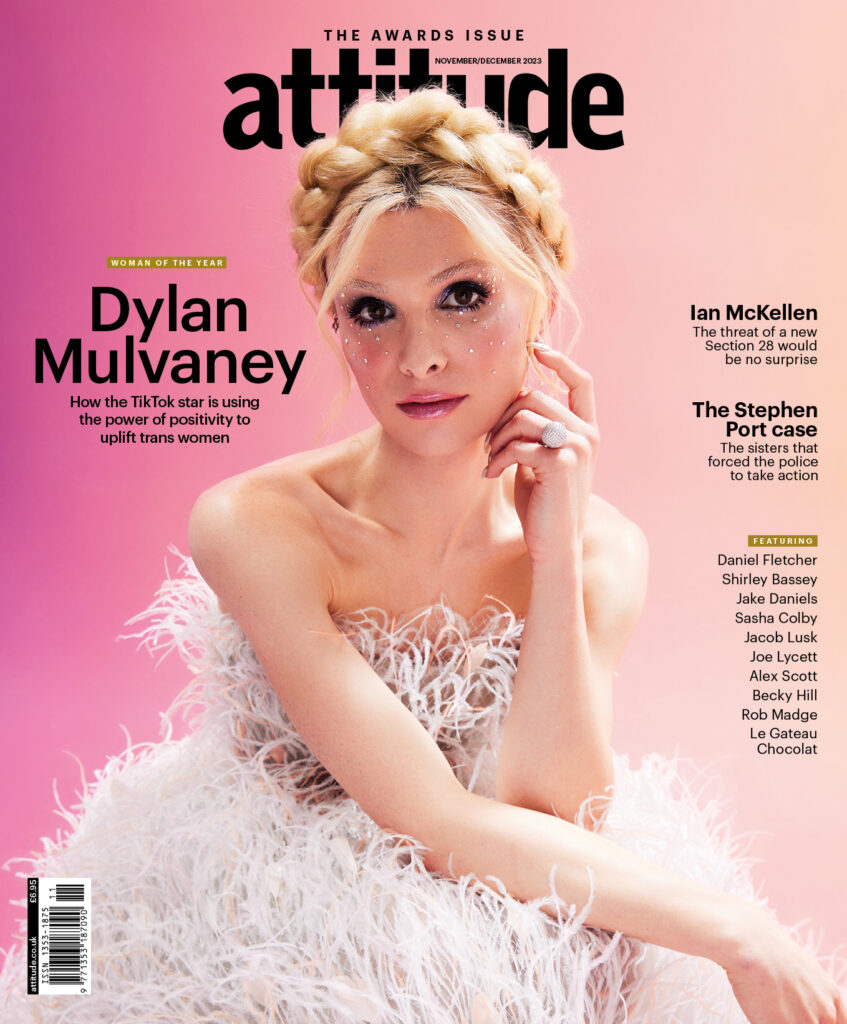Dylan Mulvaney on transphobia: ‘My womanhood is all I need to keep going’
Dylan Mulvaney is sharing the everyday highs - and lows - of her transitioning experience with the world, though her love for the community is at the forefront. This is why she's the winner of Attitude's first Woman of the Year award, supported by Virgin Atlantic
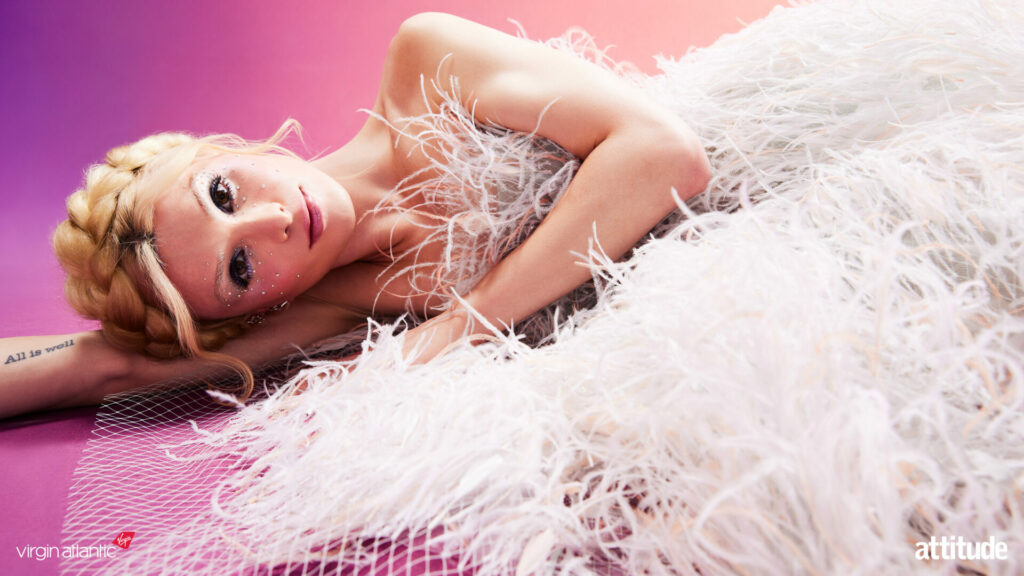
“She is born to do this,” I catch myself whispering under my breath as I am taken aback by another response of Dylan Mulvaney’s – the winner of the first Woman of the Year Award supported by Virgin Atlantic at the Virgin Atlantic Attitude Awards, powered by Jaguar.
Even across time zones, while dealing with temperamental internet connections and rushed timings, the exuberant 26-year-old’s star quality can be felt beaming through the computer screen into my muggy backstage dressing room where, just after coming off-stage in Berlin, I am chatting to her over Zoom. I find myself captivated — an inevitable response when in the presence of someone who exudes talent, wisdom and star quality from their every pore.
Mulvaney burst into the public consciousness through her incredibly popular, extremely infectious and addictively joyous social media project 365 Days of Girlhood.
In preparation for this interview, I scrolled through scores of the daily updates where Mulvaney shows all the aspects of transition and dysphoria that I was so intent on hiding. She began her journey of bringing the personal and intimate parts of transition into the public gaze in March 2022, when she posted a TikTok video entitled ‘Day 1 of Being a Girl’, which then grew into the Girlhood series. Dysphoria, name changes, being harassed, and finding new pronouns are all matters that often we trans people must process in private, yet through Mulvaney’s project, the private has become public in a way that feels cleansing and unashamed. Mulvaney’s power becomes our shared strength.
Since the humble beginnings of the Girlhood project, Mulvaney has amassed more than 10 million followers on TikTok, but her fame has also catapulted her beyond our phone screens. The past year has seen Mulvaney grace magazine covers, make television appearances, attend fashion shows, speak at the White House with Joe Biden and, recently, create a live singing and dancing spectacular for her 365th Day of Girlhood which has been praised by many adoring fans, friends and high-profile supporters. And let’s not forget that through the Girlhood series, she has raised more than $190,000 for The Trevor Project.
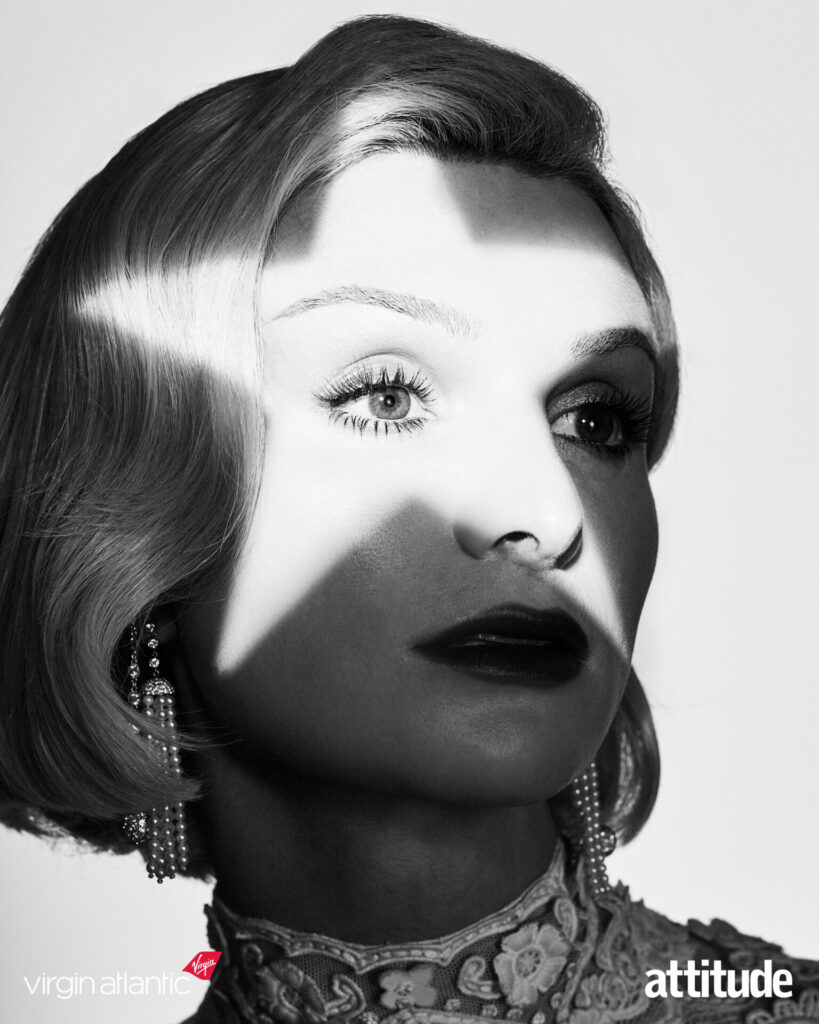
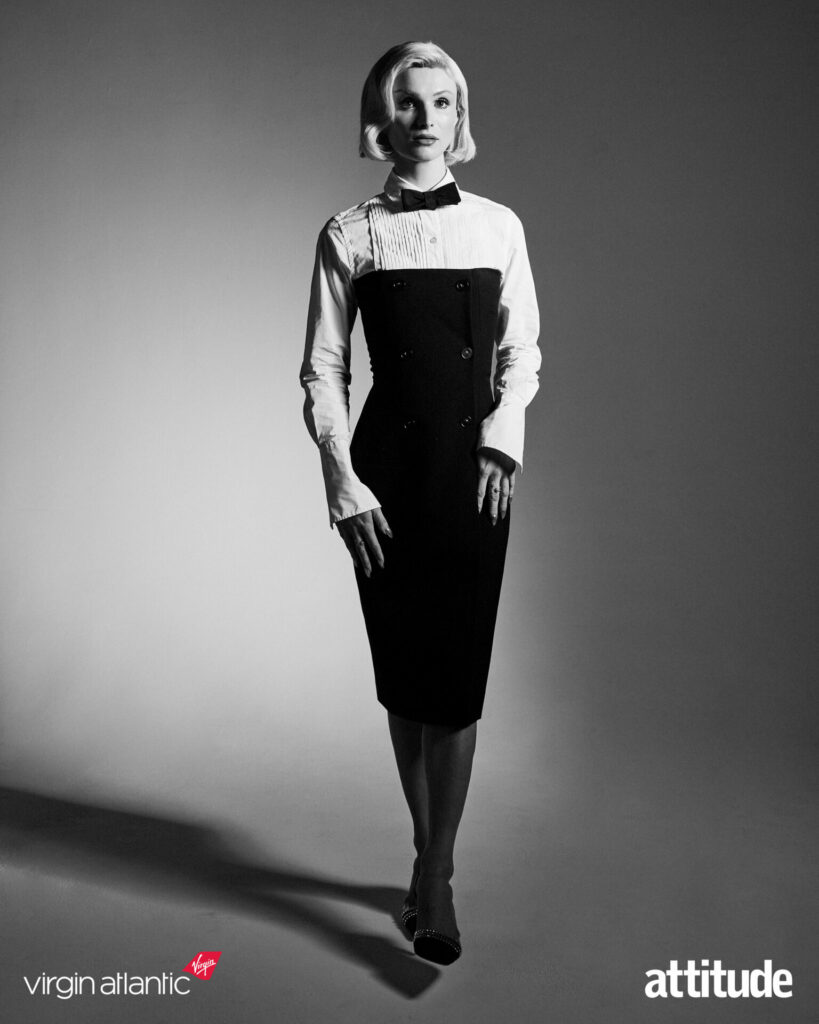
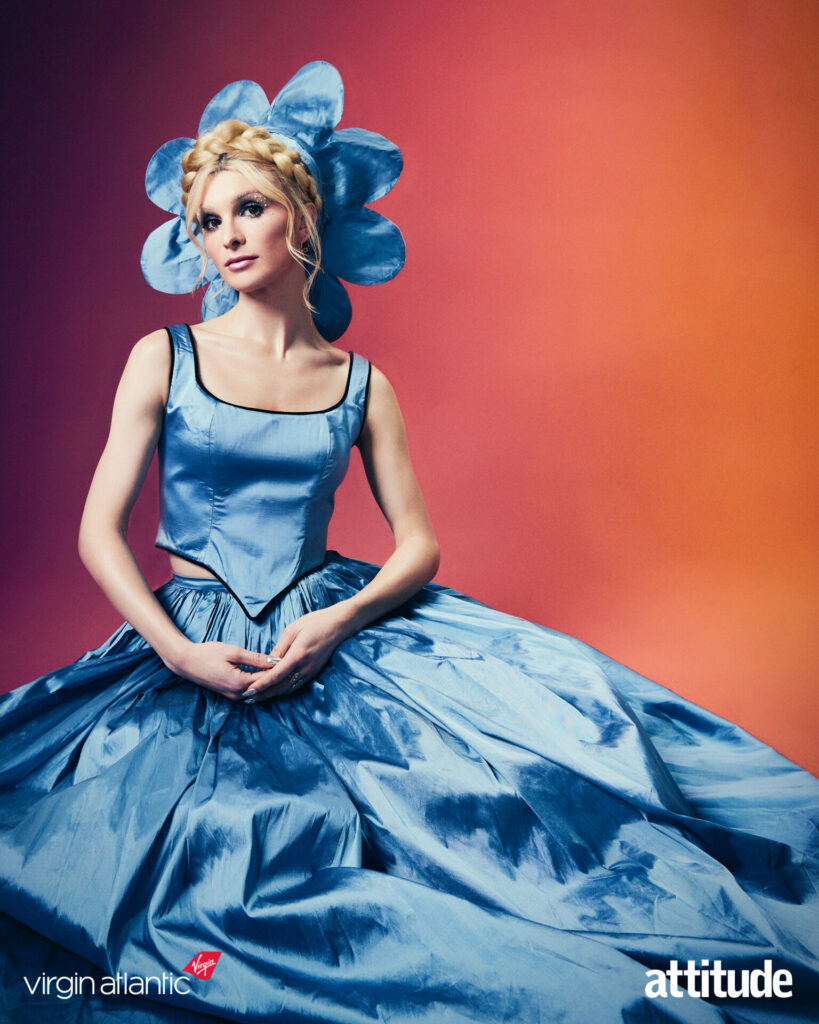
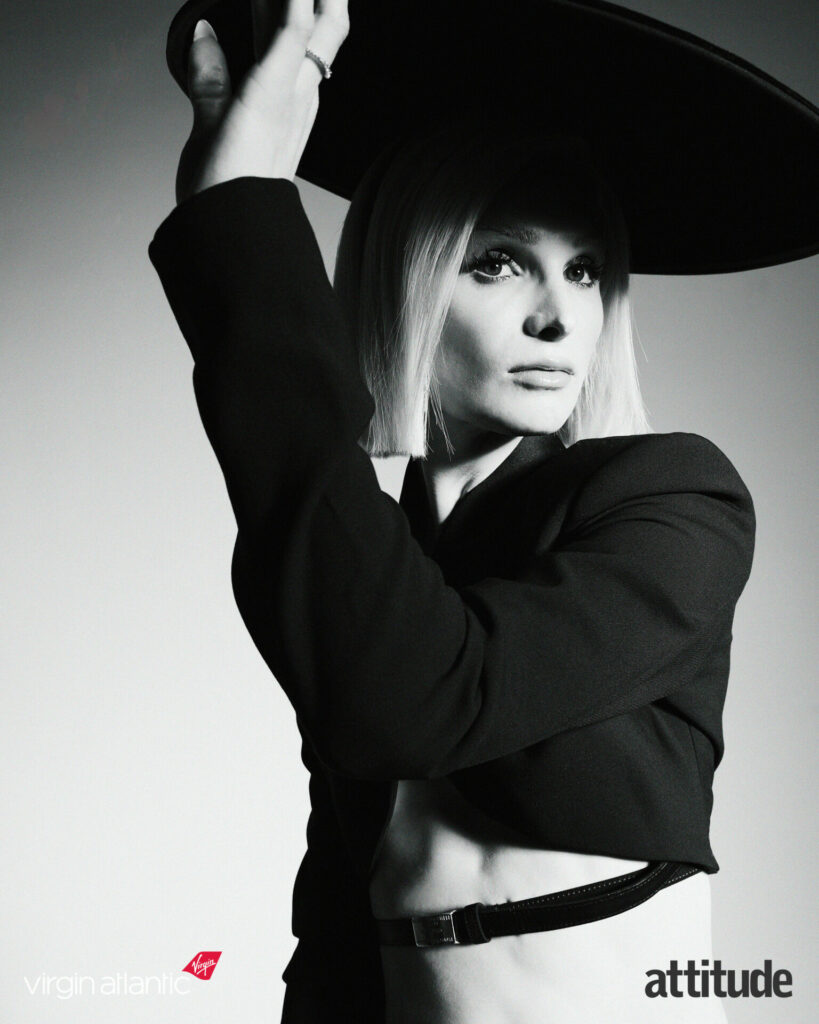
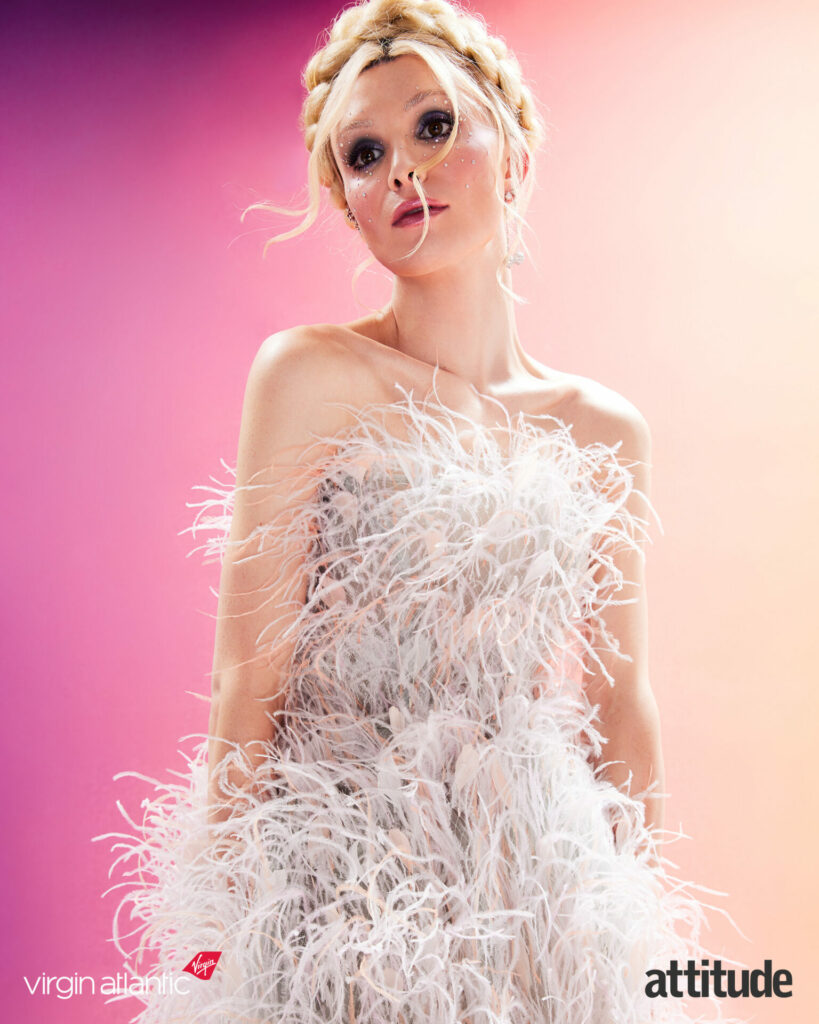
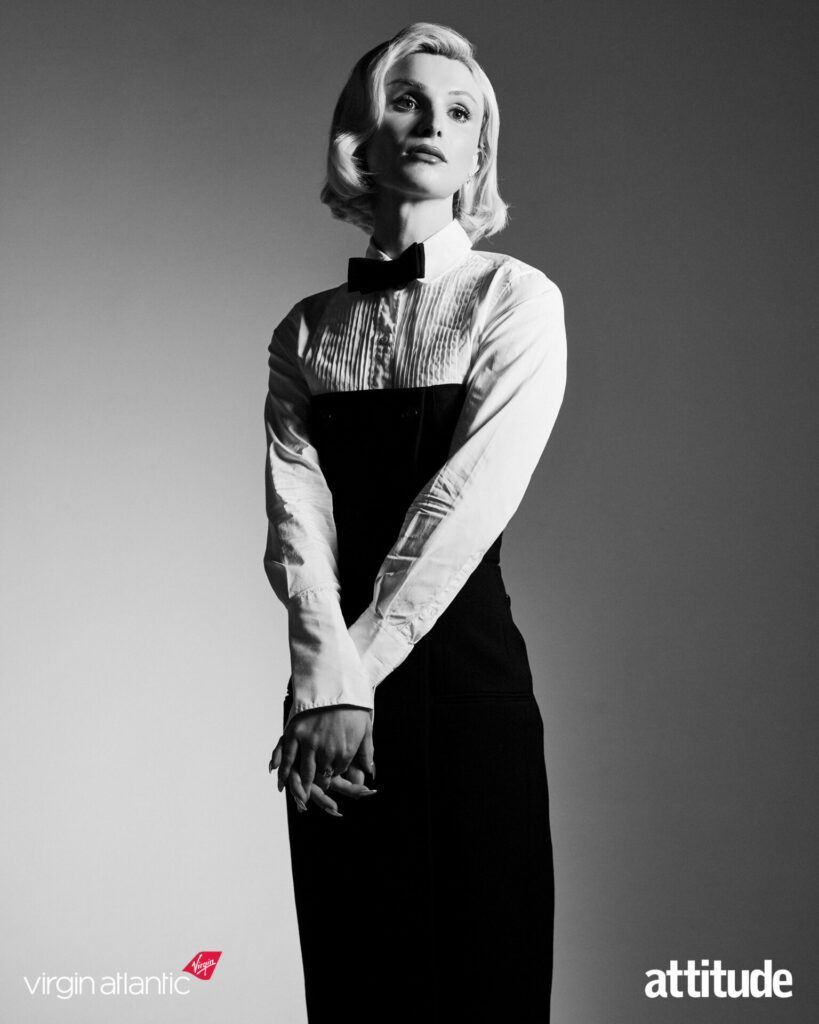
Mulvaney’s positive, honest and gleeful representation has resonated with millions, and that’s precisely why she has also become the target of hate from anti-trans extremists. Throughout the past year, she has also had to contend with continual attempts to ridicule and silence her. Most straight and cisgender content creators do not have to worry about how their brand partnerships could lead to global news stories and a bevy of death threats, but the same cannot be said for Mulvaney. This year, Mulvaney’s sponsorship deals with brands like Nike and Bud Light revealed the ugly, hateful and scary mobilisation of anti-trans hate — with relentless abuse directed at her.
Beyond the think pieces and discourse that surrounds moments such as this, past the clicks and baiting of identities weaponised to justify anger, there is a person looking at her phone, wondering how her journey towards her own self could fuel such responses, whether it be disbelief in the love and inspiration her 60-second videos have brought, or the reckoning with the pushback and danger fame may bring. Mulvaney has had to learn how to straddle the polarising nature of success and visibility while being publicly trans: the more we step into our power, the more danger we are often in. This balancing act causes many of us to turn inwards, to minimise ourselves — yet it is clear from just an hour in Mulvaney’s presence that this is not who she is. Instead, Mulvaney is charming, funny, hopeful, courageous, bold, understanding, wise and, most of all, talented.
She tells me about her hopes and dreams, including her desire to turn her musical theatre background into roles for herself and other trans people to play. She discusses which roles she wishes to portray, and stories she wants to write for Hollywood. A performer knows a performer, and I can see in the way her voice comes alive that the stage and creativity is where she belongs.
The current narrative of social media says that if we meet someone online, that is where they will always stay. Yet, Mulvaney refuses to be boxed in. She did not wait for the arts industry to become more inclusive of trans people, and instead used her tenacity and creativity to forge her own pathway. TikTok was her stage that she created when she thought no one was listening, yet now she has the world’s attention, I have no doubt that we will be seeing Mulvaney on whichever stage she desires.
Travis Alabanza: Sometimes you can get straight into the shit, and so, I wanted to ask what I think is the most important question at the moment, I’ll just start really deep: What is your girl dinner?
Dylan Mulvaney: Oh my God, my girl dinner? I’ve been eating cereal with six scoops of sugar on it. So, I didn’t understand that when I grew up; as a kid I thought everyone added sugar to their cereal. And especially Cheerios to me are so bland — then you add the six scoops.
Oh my God, six scoops. You have been to England before, right? What is your vibe of London? What do you think of it?
There’s so many reasons why I was excited about this award and this opportunity, but near the top of the list was that I got to go back to London. Because I was there to visit my best friend in July, and it was during a time where I felt pretty isolated here in the States, a little ostracised and unsafe, and I went over there, and the people were so lovely to me. I didn’t feel shame, I didn’t feel like I had baggage, and there was such a charm that I sometimes feel lacks over here. The theatre is so excellent, which is the world that I come from. I would love to do the West End. And the accents are so hot, and I really think a dual citizenship would do me good right now. So, marrying a Brit is not out of the question.
If you could catch someone up on what 365 Days of Girlhood was to you, what would be your elevator pitch be?
My Days of Girlhood series is a celebration of femininity and innocence during [a time] where there generally is shame and darkness. And I think it is less about transness as a whole and more about someone seeing themselves for the first time and meeting their true self and letting people watch.
That was a good elevator pitch. When we choose to be honest with the world, it’s a terrifying prospect. I feel like what you did is you took that agency over the journey by getting it all out in the open. You said, “Actually, I’m not going to choose to be in secrecy about that anymore.” But we know claiming agency is a tough battle. What did you gain and learn about yourself from this project?
What this project did was it showed me that I was capable of things that I had no idea were possible. And I thought of myself [as]so small because of my fear of sharing my opinions, upsetting anyone, going against the status quo or the generalised normalcy of society. And I think by slowly breaking out of that mould, I found that I was completely limitless: not only in my talents, but more so in my ability to connect with other humans and with community. And I was part of the community before transitioning — as some would say, a twink — but I didn’t really know what community was until I was a part of the trans community. It’s about a mutual respect and understanding that what that person is going through is difficult in a range of ways, in that when I meet another trans person, there’s this automatic sense of grace with each other.
The positive part has been the chosen family that I’ve built. I think I’ve also built relationships with all sorts of trans women and cis women that have shaped me in the last year, and [it’s] shocked me how willing some of these women were to help me, to teach me, be with me and watch me stumble and grow. And that’s, I think, my hope going forward, that I can do that for other people and women as well.
Beautiful. I feel like what comes across in the work you do is the charm, the wit, the humour, the joy. I know that the internet can make us all really 2D versions. It packages us up and says, “This is who this person is now, and this is who they’re always going to be to us.” But we know that we’re more than that. Who do you see yourself as? What other parts of you are there that are not about the 365 days on the internet?
I think I am silly beyond belief. I think of myself as camp in the way that I could absolutely go and tear up a stage right now in some wild costume, but I also could fully go camping in the woods and have a great time with not a stitch of makeup on. I believe that I possess duality. I think some people don’t get to see me because of the way that not only I put myself out there, but how people choose to take me in. People on the street truly assume like, ‘I know Dylan, I know everything about her. This is who she is.’ And a lot of them love that version of me that they painted in their head, but there’s probably, like, 85 per cent left that they don’t know yet.
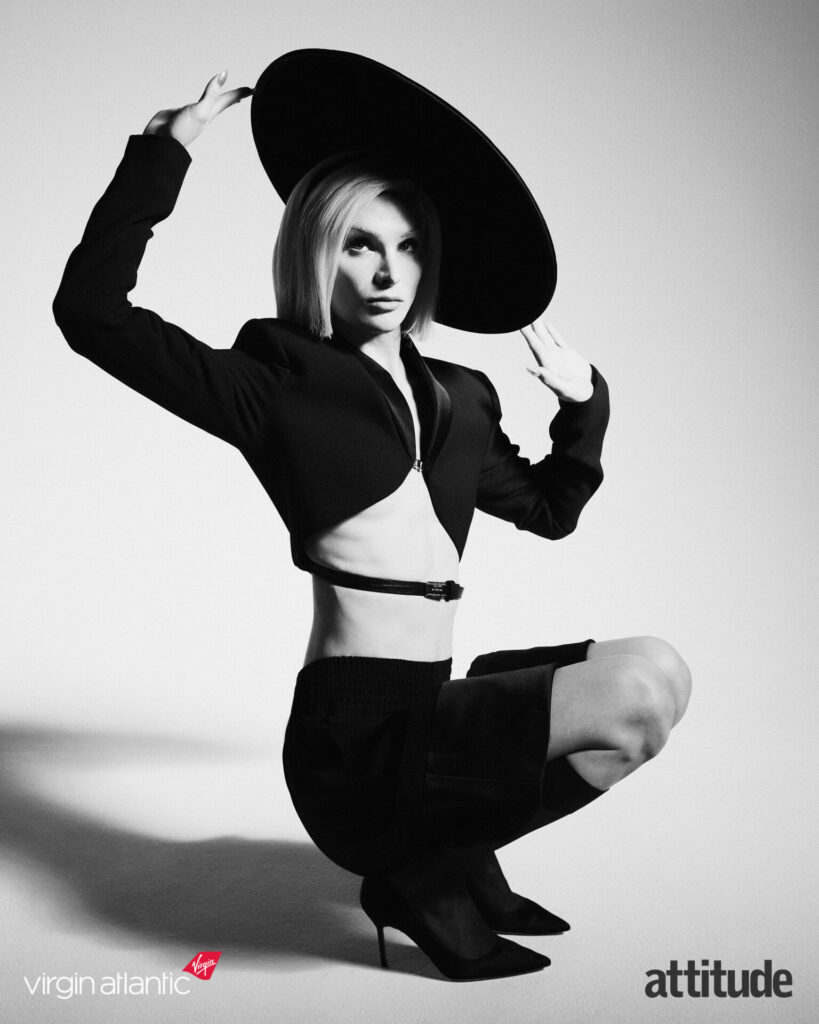
And that’s what I’m excited at getting at because as my success has gone on in this past year, I’ve realised that I do love to share. I’m on the older end of Gen Z, but we are just an oversharing generation and that’s how we operate. And I don’t want to feel shame in that because I think so much good can come from honesty and opening up.
Some of my favourite moments this past year were when I put myself on blast. There was one particular video where I showed myself with a full beard of facial hair — I think it was around day 30 because I’d just gotten laser hair removal and I had to grow it out for a bit, and it was the thing I was most embarrassed about. And then I went on and I made a video, got, like, 40 million views, and there was no shame with me walking out on the street with a little bit of stubble because I [had] already owned it, and the world had already seen that. Any time after that that I got a comment that was like, “I can see your five o’clock shadow,” I say, “Yeah, no shit. I showed you that on day 30.” I love that the internet, as scary as it can be, it also can be so powerful internally and healing in some ways.
You’re saying, “This is us and it gives us our ability to see ourselves back.” If they see pride in you, then they know that they can feel that too. Do you ever imagine how many people that you may have touched?
I don’t… Sometimes it feels like an accident. I can’t comprehend why people enjoy me so much, but then I’ll go to a university where I spoke at a freshman orientation recently. It was a group of 18-year-olds, and I’ve never experienced an energy and a kindness as at that event. And as shocking as it was, I sort of realised in youth, a lot of us didn’t have people to look up to at all. I mean, for me, I had Kurt Hummel on Glee or Jack on Will and Grace, but those were gay men. I didn’t even see myself reflected as a young trans person anywhere.
I know a theatre kid when I see one. Was the theatre your place in high school?
Well, I started dance class when I was three. People assume California is wildly liberal, but this town in particular was not, and I was the only boy that was in dance class. I’m really grateful to my parents for allowing me to be there. But I was able to sort of infiltrate the professional theatre scene in San Diego and got to work with older people and watch gay people thrive. That was always my safe space. It still is. And I think when I feel ostracised or kind of put out as a whole, especially these last few months after the controversy, I always knew that the theatre would be a safe place for me. And I knew that if all of this mainstream brand partnership left, that the theatre community would still have my back because we are the misfits, we are the weirdos, we are the odd ones out.
There’s something so beautiful about having grown up in theatre, then getting introduced to the mainstream media and all of these new situations, but bringing my theatre kid energy to these larger platforms, then hopefully getting to return to the stage again — that’s my biggest hope.
Do you see yourself as an activist?
I don’t use that word. I’m starting to get more comfortable with ‘advocate’. I think as I find myself in more spaces that represent trans people, or to move our progress forward, I am seeing my role in this more clearly, and that is to provide platforms and resources to trans people. Going forward, my purpose feels like it is to perform, entertain, make people think, make people smile, make people laugh. I see that being through Hollywood in that if I can start a production company and bring trans people in to make their stories, that feels like my version of activism.
My page, generally, I keep it very positive, kind of a really safe place for people to come and access transness through joy. But I also am well aware that there are moments where I have to show up, and I have to talk about the hard things or find someone to talk about the hard things because otherwise what good is having access to 12 million people if you can’t do something with it?
I feel like you touched on something really important there, that sometimes when trans people are just being ourselves and showing ourselves, the labels get continually put on, like, “You’re now an activist, you are now this, you’re now that.” And actually, you’re just a person showing up in the world. And I think it’s so beautiful that you said, “My goal is to entertain and find art and find joy.” Because the theatre kid blood never leaves you and you are allowed to do that. And that in part shows trans people the possibilities that can happen too. I’d love to then ask, what’s your dream role?
I love Glinda in Wicked, but lately I really want to play Elle Woods in Legally Blonde.
I can see it. It’s there. The material is there…
The material is materialing and the hair is hairing. And I really feel like transness can exist in that world. And one of my favourite concepts is just taking existing material and inserting a trans person into it, because it ultimately changes the story and yet it actually just makes it better. I even think if they put a trans girl in Mean Girls, you then see a trans teenager trying to feel accepted and doing things because they’re wanting to feel a part of that femininity and that girl group. And so, transness is everywhere, and it should be everywhere, but we need it in these stories that not only already exist, but then the new ones that are coming down the pipeline.
As someone that in England in 2017 was quite hounded by the press, I know how it can shape the way you feel about yourself. What advice do you have about how to push through when people are misunderstanding you?
I think limit the voices that have access to your mind and then start from yourself. And then, as you go outward, collect the people that know you as well as anyone really could — whether that’s your family, your closest, best friend, your therapist — and get their take on the situation. Because when trauma happens, sometimes we can’t see ourselves as we truly are, but the people that love us and know us can reflect back to us who we are and help remind us of what we’re here to do or what they see in us. It helps me a lot to be able to reach out to my loved ones like Alok, Jonathan Van Ness, my life coach Maury, my family, Lily, and say, “Is this right? Are these things they’re saying truthful?” And having them be the ones to tell me that I am still good, that I didn’t do something wrong, that I’m still beautiful. That really helped me.
It is such an incredibly turbulent and violent time for our community. What do you think people reading this that want to support trans people should activate in themselves to fight this moment that we’re in?
Allyship right now needs to look very different than it did just two years ago. We need them in ways that are so much more than just existing with us. We need them to truly protect us and to stand up for us and to fight. And I think people, even allies, are so scared of saying the wrong thing that they don’t say anything at all. And in that there’s a lot of fear in general, whether it’s fear of trans people or fear of upsetting trans people or fear of befriending a trans person. I come from a conservative family; I hear so much of what they say and can understand because of my upbringing, but I also have seen change firsthand, and I’ve seen empathy and understanding where there wasn’t any before. So, I know it’s possible and that’s why even with everything that’s happened to me this last year, I still am glass half-full. I never want to be jaded.
I know a lot of the community right now is really tired and worn down, and it feels sometimes like it’s getting worse rather than it’s getting better. But I always think about gay marriage over here in the States and how I remember sitting in church when I was probably 10 and hearing the pastor say that we can’t support these marriages between two men or two women, and we need to fight this. And now, as a 26-year-old, in my country, [gay] marriage exists. And it sort of leaves me hopeful that if 16 years ago gay marriage was so taboo, that maybe transness in a number of years will also be like, “I can’t believe that we didn’t celebrate that and accept that widely and publicly.”
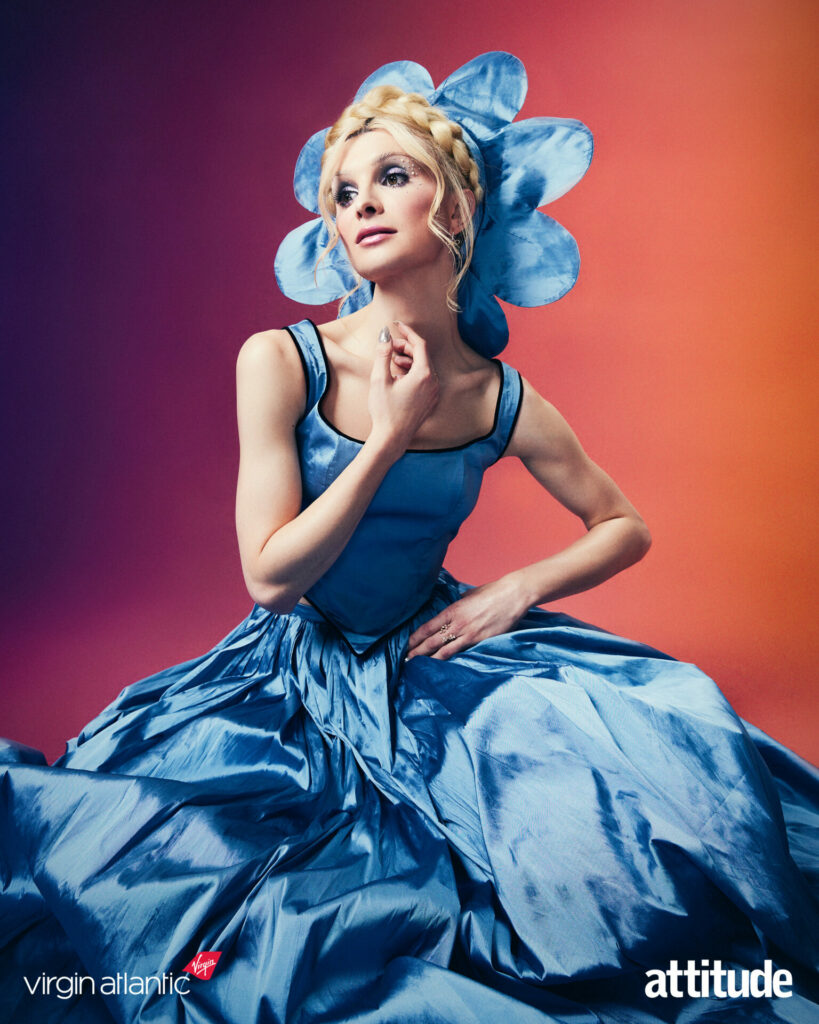
So, I just want to see more and more wins for the community, because I think that’s such a great way to stick it to them and to say like, “Hey, no, we’re thriving. We’re going to be fine. We could use your help rather than your hurt.” But, ultimately, we are going to get through this.
The reason you’re coming to London is to get the Attitude Award Woman of the Year, supported by Virgin Atlantic. Is it going to be added to the Instagram bio? Is the dating profile going to change?
I think that being honoured as Woman of the Year is a reminder in how to carry myself going forward, no matter the environment. I actually think it’s going to make for a good check-in before I put out anything into the world because now I can ask myself, “Is this Woman of the Year behaviour?” So that’s sort of where my mind is. We’re around Day 560 [of the ‘Girlhood’ series], so that’s rather quickly to be granted a title like that. But I especially love that it’s being given to me by a queer media outlet because the community is my highest priority when moving through these new doors that have opened for me in the past year. And when transphobia is so rampant all over the world, and allies and news organisations aren’t sure how to support us, knowing that my community sees me this way and acknowledges my womanhood is all I need to keep going.
I love that. If you were giving your award for Woman of the Year, who would be your Women of the Year?
OK. My life coach Maury is an incredible woman who’s gotten me through all of the dramatic times. My glam squad, the women that put makeup and hair on me, are truly angels of this world to make a trans woman feel beautiful. I have trans women that glam me, I have cis women that glam me — all of that is sisterhood in the most amazing, affirming way. My best friend Lily, she’s known me since I was 10, and has seen every single version of me and has loved every version of me. That to me is, like, Woman of the Year behaviour. And I think my mom, who has been put through hell and back this year. And for her to call me her daughter and to use my pronouns in a time when so much of the world is against me, she’s one of my Women of the Year.
So, last question: imagine 10-year-old Dylan — what would you tell your younger self and what do you think you need to hear from your younger self right now?
I would say, “You are a gorgeous girl that hasn’t been able to exercise that quite yet. But if you can stick around long enough, you’re going to see that that is the truth and your identity.” And I think my 10-year-old self would look at me and say, “You are the coolest person I know.” And I think she would watch my TikToks, and she would be in complete shock at what we’ve been able to conquer, and probably wouldn’t be able to believe that that would be her based on the fear and the survival that she was just trying to get through each day. And I think she’d be really, really proud.
Words Travis Alabanza Photography Julia Johnson Creative director Joseph Kocharian Stylist Laura Sophie Cox
The Attitude Awards issue is out now.
